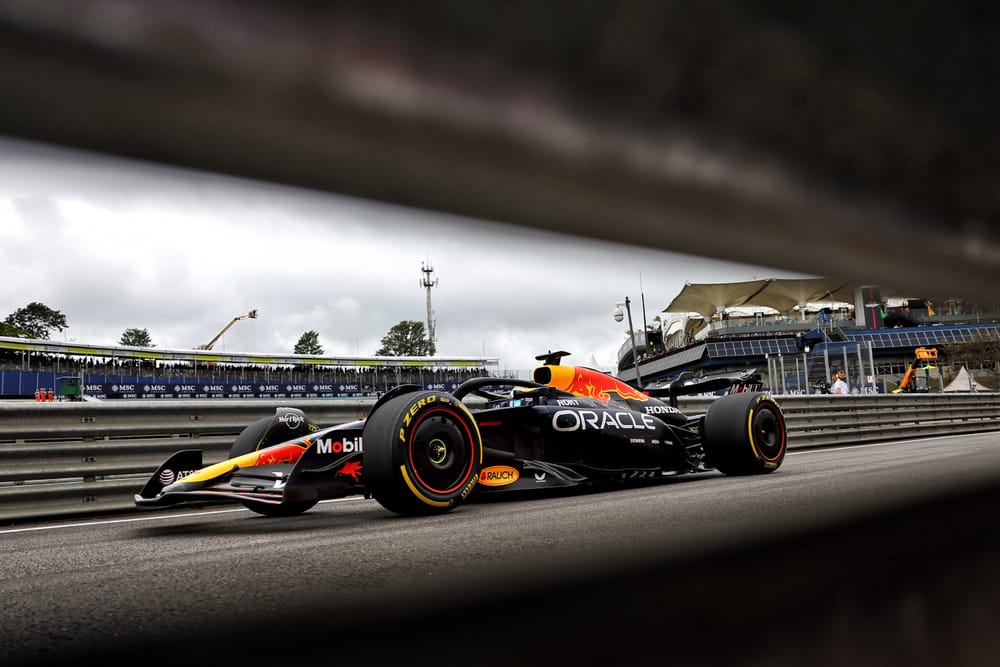McLaren is seeking answers from the FIA about whether Max Verstappen's fresh engine swap at the Brazilian Grand Prix will come out of Red Bull's Formula 1 cost cap allocation.
After Red Bull's qualifying disaster at Interlagos - as it had both cars out of Q1 for the first time since the 2006 Japanese GP - the team elected to make major changes to Verstappen's car ahead of the race.
As well as revising the set-up, Red Bull took the opportunity to fit an entire fresh Honda power unit.
This included taking an extra internal combustion engine, turbo, MGU-K and MGU-H beyond the four allowed for a campaign, plus a third battery and control electronics.
With F1 engines suffering some degree of degradation over their full life, a new engine can be beneficial both in terms of the ultimate power it can deliver and how aggressive it can then be run.
But Red Bull's decision to go for a new power unit for pure performance reasons has raised eyebrows at title rival McLaren.
The issue revolves around what is understood to be guidelines from the FIA about when engine changes do or do not need to be included within a cost cap figure.
It is an area that is not specifically covered in the published regulations, but falls under the remit of understandings that have been reached between competitors and the governing body.
Some teams, including McLaren, believe that if an extra power unit is used because of genuine reliability concerns then that should not have cost cap consequences.
However, if a team voluntarily opts for an engine swap for pure performance reasons, then that should fall under the cost cap.
The thinking behind this is that having a cost implication deters teams from repeatedly throwing fresh power units onto a car for performance reasons.
However, the dispensation for reliability-based changes to fall outside the cap means teams facing an emergency power unit change in the final events don't suddenly trip over the cost cap limit (through no fault of their own if they're not a manufacturer team) if they suffer a late unexpected failure.
Speaking at the Brazilian Grand Prix, McLaren team boss Andrea Stella said he was interested to know from the FIA what the situation was with Red Bull – and whether it was in line with his own team's interpretation of the rules.
And that was especially important because he says McLaren's belief about the financial impact of engine changes for performance reasons is why his squad is steering clear of such a swap.
"To be honest, these kind of power unit changes, they challenge the regulations," explained Stella.
"I will be interested in understanding if the cost of this engine now goes in the cost cap or not.
"If the engine was changed for performance reasons, it should go in the cost cap.
"So let's see if this is the case, not that I will be able to see, as it's all on the Red Bull side.
"But this is also one reason why we wouldn't do it, because it would end up in the cost cap."
The Race has contacted the FIA for clarification on what the cost cap situation is regarding power unit changes for performance reasons. Red Bull has also been asked for its understanding of the matter.
How big a help was the new engine?
Red Bull was open that it elected to change the power unit on Verstappen's car because there was a performance gain to be had.
However, just how much benefit it delivered is hard to quantify – as the huge step forward in pace in the race on Sunday was mostly down to other set-up changes.
Team boss Laurent Mekies said Red Bull had been comfortable that the life on all its power units was good enough to get to the end of the season – but it made sense to throw a fresh engine into the pool.
"It's always good to fit a new engine," he said. "It's fair to say that in the last part of the season, we were on schedule to finish the year without needing the change. We just felt that we would take the opportunity mainly because we wanted to change the car again.
"It's difficult to give you a number [of the laptime benefit], but the gaps are small enough for everything to be important."
McLaren boss Stella felt that fresh engines nowadays do not deliver as big an advantage as they did in the early years of the turbo hybrid rules, because manufacturers had got better in keeping performance at a high level.
"I don't know how this works for Honda, but in general these engines, they don't exhibit much degradation with mileage," he said.
"So that's why in general you wouldn't change an engine and accept a penalty, or a loss of positions, because normally the performance you get back doesn't really compensate for the positional losses.
"But, like I say, I'm not sure how the power degradation works for Honda."



